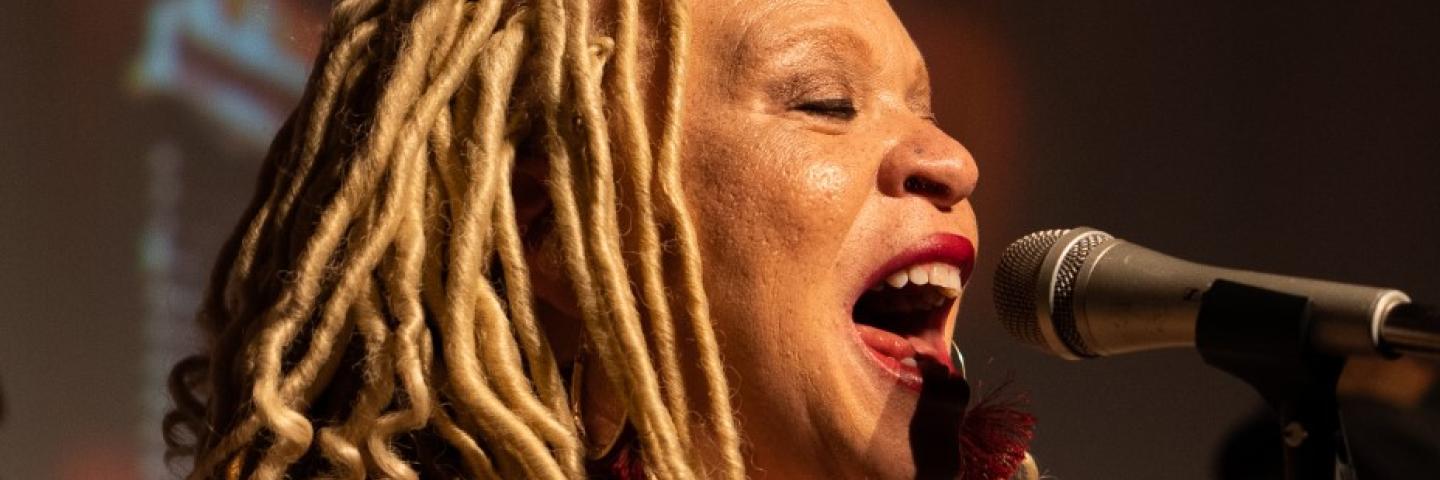 | Traditional Skill/Art Craft: Black Gospel and Blues Singer Years Awarded: 2020 Contact Information: Phone: (503)927-0410 Email: lahrondasing@gmail.com Website: https://larhondasteele.com/ |
ARTIST BIOGRAPHY
LaRhonda Steele was born in Oklahoma and grew up singing traditional Black gospel from a very young age. She started directing the choir at the age of 15. She has led the Portland Interfaith Gospel Choir since 2013 where she teaches traditional Black gospel music, its history, and its reference to current socioeconomic states of Black people in America.
LaRhonda participates in a gospel quartet called “The Group” featuring pianist Janice Marie Scroggins, with singers Linda Hornbuckle, Ron Shoals, herself, and Mary Etta Callier. She also leads church choirs at Unity and PCSL centers. In 2018, she sang with the Italian choir, The Pistoia Gospel Singers, and taught the choir the contemporary English gospel song “Music is a Voice of God.”
APPRENTICE BIOGRAPHY - Lauren Steele 2020
Lauren Steele is a singer, songwriter, and actress from Portland, Oregon, and the daughter of LaRhonda Steele. She grew up in a household surrounded by gospel, soul, jazz, and the blues. She obtained a degree in theater from Southern Methodist University, where she received awards for excellence in both acting and playwriting.
After graduation, she moved to New York to continue her career in theatre. She has been an active member of various choirs, productions, and competitions and has taught songwriting workshops at Ethos Music School. She is currently working in Portland on her first album, which is set to be released in summer 2021. She aspires to be an artist and teach the next generation of Black artists about their history through the lens of music and theatre.
Q+A WITH THE MENTOR ARTIST
Describe your traditional art.
Body
My cultural tradition is Black gospel music in the quartet and choral vocal stylings of its origins from slavery to current day. This traditional music is typically practiced orally/verbally at church or in homes. In the past, it was practiced on the cotton fields. Lyrics and melodies are sung to other singers and then repeated back until the entire song is learned and embedded into memory.
This tradition is part of my culture through my ethnicity and family traditions. I am a descendent of enslaved Africans. This traditional music is meaningful to me because it is an African American contribution to the country’s arts. It’s meaningful for me to be a part of a community. Singing runs through my lineage. From slavery, to my mom, to me and then to my daughters. Singing brings me joy and connection to life. I am proud to teach it to others to continue its legacy.
How did you come to learn this tradition?
Body
I learned and practiced traditional black gospel from a very young age. A large part of Black culture is going to church on Sundays, this is an integral part of life stemming from slavery. I was born in Oklahoma and grew up singing with my family and friends in black churches. We sang acapella harmonies at the Church of Christ and after joining a baptist church we sang with musical instruments; piano, organ and drums.
I learned the tradition from my mother. I taught myself to sing by listening to her, singing along in church and by singing with the radio. I learned to direct the choir from our pianist at Pleasant Ridge Baptist Church. She taught me the basics of leading a choir in performance: set the song tempo, cue the singers when to sing, clap, and sway, sing the words and melody with the choir, cue soloists, and cue song endings.
Why is this cultural tradition important to your community?
Body
Singing is important to the Black community for several reasons: The origins of oral teaching and learning of gospel music stems from the roots of slavery. Oral/verbal communication allowed African slaves to communicate with messages to one another in order to plan escape from the brutality and torture of being enslaved and stripped of their traditions.
Singing added cohesiveness and served as strength to those who courageously marched and protested for equal rights during the civil rights era and also serves as a look into current social/economic affairs of African Americans. Singing together allowed expressions of praise and worship to God, expressions of joy and of sorrow and the great hope of deliverance from current situations.
Black gospel choirs and vocal groups performances were usually reserved for church services and concerts (we used to call them “musicals”) but now can be heard at festivals, weddings, funerals, in album recordings, and many other ceremonies.
Experience/Honors
Body
2020 (postponed because of COVID19) to 2021 Larhonda will be inducted into the Oregon Music Hall of Fame
2019 Larhonda was inducted into the Cascade Blues Associations Hall of Fame
2018 Larhonda received special recognition for participation in the 2017/18 Porretta Soul Festival in Porretta Italy from the Associazione Culturidea the nonprofit organization that sponsors many Cultural events there and in surrounding areas.
2016, 17, and 18 Larhonda won the Muddy Award from the Cascade Blues Association for the Duffy Bishop Best Female vocalist
Visit OFN's Culture Keepers Roster to learn more about the artist.
Traditional Arts Apprenticeship Program
More OFN programs
OFN main page
